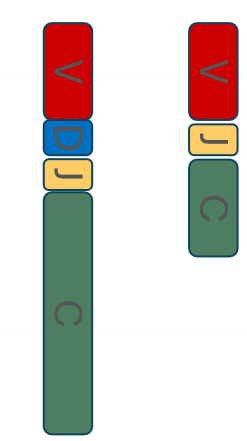Evolution of Antibodies
1/27
There's no tags or description
Looks like no tags are added yet.
Name | Mastery | Learn | Test | Matching | Spaced | Call with Kai |
|---|
No analytics yet
Send a link to your students to track their progress
28 Terms
antibody
A protein produced by B cells that binds to specific antigens.
What are the main functions of antibodies?
Neutralise toxins and viruses
Opsonise pathogens
Activate the complement system
Agglutinate particles
Mediate ADCC (Antibody-Dependent Cell-mediated Cytotoxicity)
What does the variable region of an antibody do?
Determines antigen specificity.
What does the constant (Fc) region do?
Determines the class and function of the antibody.
What are the structural components of an antibody?
2 identical heavy chains
2 identical light chains
What is the difference between BCR and antibody?
BCR is membrane-bound on B cells; when secreted, it's called an antibody.
What do B cells differentiate into?
Plasma cells that secrete antibodies.
How is antibody diversity generated?
Through gene rearrangement – combining different V, D, J gene segments.
What is the difference in gene segments used in heavy and light chains?
Heavy chain: V, D, J segments
Light chain: V and J segments only

What process links DNA to protein in antibodies?
DNA → RNA → Protein
How does the antibody repertoire evolve over time?
Through exposure to antigens and selection of high-affinity antibodies.
What is the term for this selective process?
Affinity maturation
What is somatic hypermutation?
Deliberate mutation of Ig genes in dividing B cells.
Where does affinity maturation occur?
In germinal centers of lymphoid organs.
What determines which B cells survive in germinal centers?
B cells with high-affinity antibodies bind more antigen, present it to T cells, and receive survival signals.
What is meant by “repertoire change”?
Previously evolved antibodies can participate in new responses and further evolve.
What are plasmablasts?
Activated B cells that secrete antibodies but haven’t yet matured into plasma cells.
What are memory B cells?
Long-lived B cells that can quickly respond to previously encountered antigens.
What determines an antibody's class?
The Fc (constant) region.
Can the antibody class change without changing antigen specificity?
Yes — through class switch recombination.
What are the major antibody classes?
IgM, IgG, IgA, IgE, IgD.
What are the IgG subclasses?
IgG1, IgG2, IgG3, IgG4.
What are the IgA subclasses?
IgA1 and IgA2.
What is the function of IgM?
First antibody produced; forms pentamers; strong at complement activation but cannot cross placenta.
What is the function of IgG?
Main antibody in blood; opsonisation, ADCC, and crosses placenta.
What is the function of IgA?
Found at mucosal surfaces and in breast milk; forms dimers; resistant to digestion.
What is the function of IgE?
Important in parasitic infections and allergic responses; binds to mast cells and triggers degranulation.
What is the role of IgD?
Found on naïve B cells; role still not fully understood.